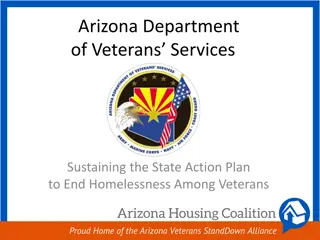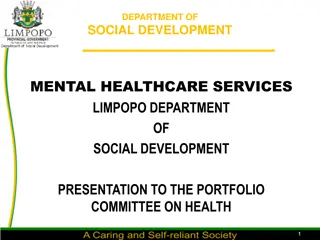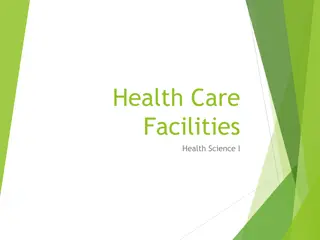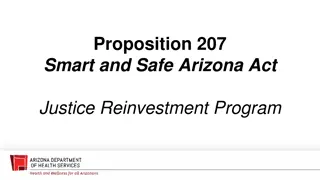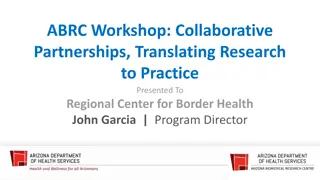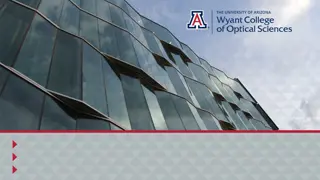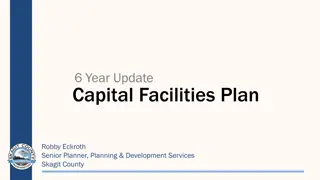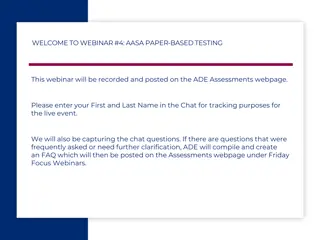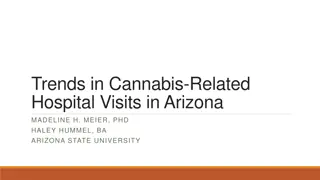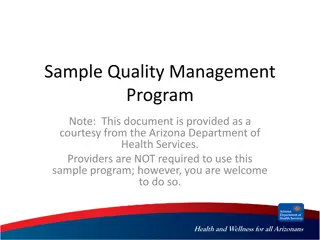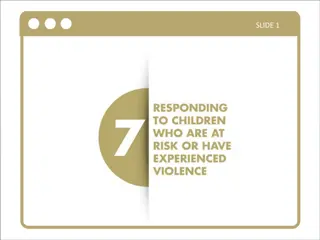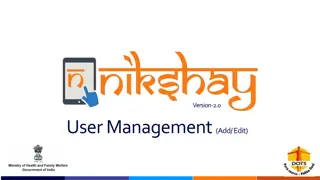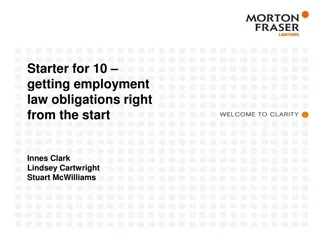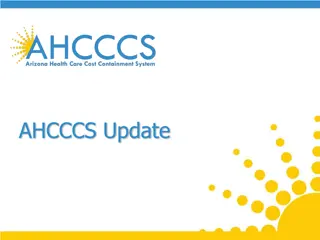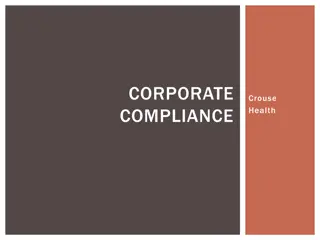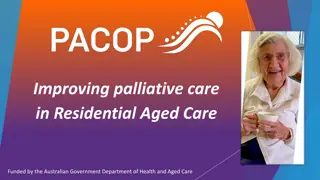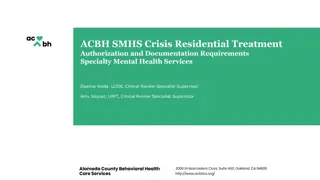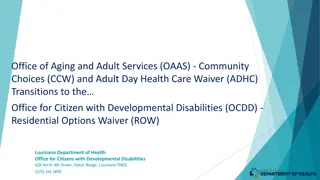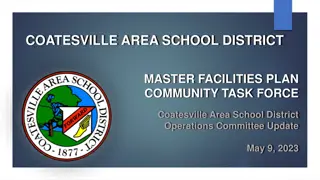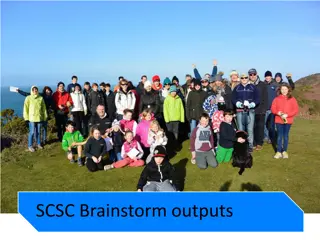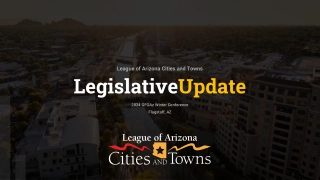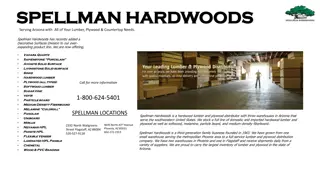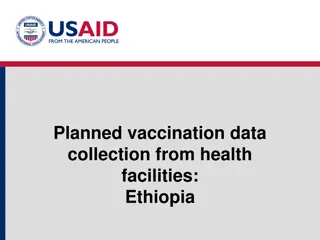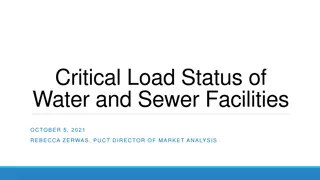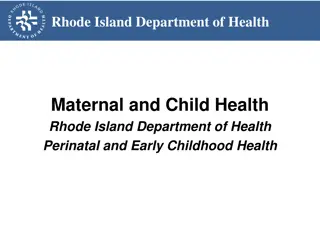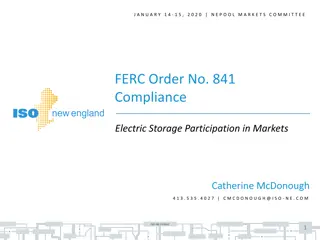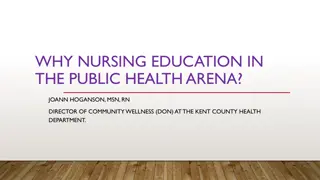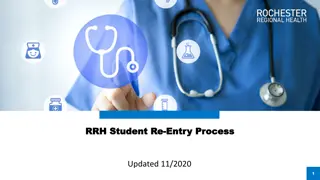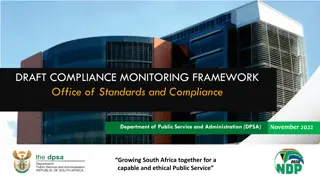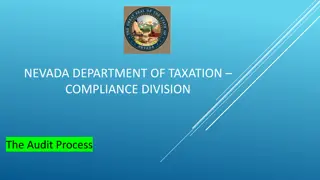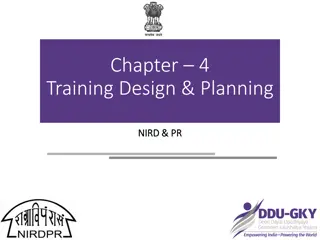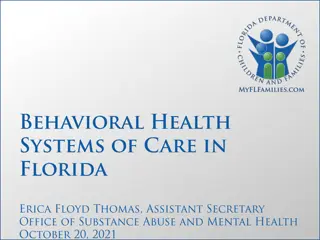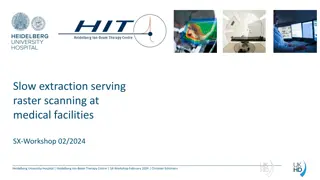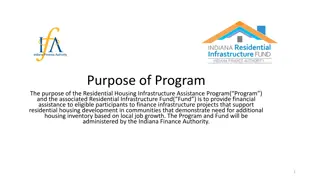Ensuring Compliance in Residential Facilities by Arizona Department of Health Services
Presented by the Bureau of Residential Facilities Licensing, this training emphasizes the importance of compliance with Arizona's rules and statutes for various residential healthcare facilities. The program covers survey types, Plan of Correction preparation, common deficiencies, Compliance Team information, enforcement trends, and online resources to assist facilities in meeting regulatory requirements.
Download Presentation

Please find below an Image/Link to download the presentation.
The content on the website is provided AS IS for your information and personal use only. It may not be sold, licensed, or shared on other websites without obtaining consent from the author. Download presentation by click this link. If you encounter any issues during the download, it is possible that the publisher has removed the file from their server.
E N D
Presentation Transcript
Maintaining Compliance in Residential Facilities Presented by The Bureau of Residential Facilities Licensing
Arizona Department of Health Services Cara Christ M.D., Director Division of Public Health Licensing Colby Bower, Assistant Director Health Care Institution Licensing Kathryn McCanna, Branch Chief Bureau of Residential Facilities Licensing Harmony Duport, Bureau Chief
Office Locations and Phone Numbers Phoenix: 150 N. 18th Ave., Suite 420 602-364-2639 FAX: 602-324-5872 Tucson: 400 W. Congress St., Suite 116 520-628-6965 FAX: 520-628-6991 Website: http://azdhs.gov/licensing/residential-facilities/index.php Email: Residential.Licensing@azdhs.gov
Bureau of Residential Facilities Licensing (BRFL) Licenses, regulates, and provides training to Residential Healthcare Facilities, including: Assisted Living Centers Assisted Living Homes Adult Foster Care Homes Behavioral Health Residential Facilities Adult Day Health Care Facilities Behavioral Health Respite Homes Adult Behavioral Health Therapeutic Homes
Purpose of this Training Review various types of surveys and the survey process Introduce the basics of preparing an acceptable Plan of Correction (POC) Review the top ten most commonly cited deficiencies Provide information regarding the Compliance Team and trends in Enforcement Assist in navigating the Bureau s website for additional resources
Bureau of Residential Facilities Licensing (BRFL) Based on Arizona s Rules and Statutes Our goal is COMPLIANCE we want to help you to be in compliance with the applicable Rules and Statutes for your facility It is YOUR RESPONSIBILITY to ensure that YOU are aware of the rules as they apply to YOUR facility
Applicable Rules and Statutes Licensing of Residential Facilities is governed by the Arizona Revised Statutes ( A.R.S. ), primarily: Title 36: Public Health and Safety, Chapter 4: Health Care Institutions Reference to a statute generally uses this format: A.R.S. 36.401.A.1 or A.R S. 36.401(A)(1) Statutes are law, and authorize the Department to adopt Regulations or Rules which govern Health Care Institutions. Rules are contained in the Arizona Administrative Code ( A.A.C. ), primarily: Title 9: Health Services, Chapter 10: Department of Health Services Health Care Institution Licensing Reference to a rule is generally in this format: R9-10-803.A.3.a Rules are broken down into Articles specific to each type of facility.
Rules Governing Residential Facilities Article 1: General Article 7: Behavioral Health Residential Facilities Article 8: Assisted Living Facilities Article 11: Adult Day Health Care Facilities Article 16: Behavioral Health Respite Homes Article 18: Adult Behavioral Health Therapeutic Homes You can find the most up-to-date copy of the rules at our website: http://www.azdhs.gov/licensing/residential- facilities/index.php#providers-home
Types of Surveys There are five main kinds of surveys that Surveyors will conduct: Initials Change of Ownership (CHOWs) Compliance Amends Complaints
Change of Ownership (CHOW) Inspections If you are purchasing or leasing a facility that is already licensed as a Residential Facility, this is referred to as a CHOW A.R.S. 36-422.D: the current licensee must notify the Department in writing at least 30 days prior to the planned change of ownership and ensure services are not interrupted The new owner must submit an initial application and must not begin operating the facility until the Department issues a license CMP s will be considered and assessed if the Department does not get notification of a CHOW
Compliance Inspections Compliance inspections are conducted once per licensureperiod Your licensure period runs for 12 months Not always going to be January 1-December 31, it s printed on your license A Surveyor can show up at ANY point within your licensure period for the compliance survey The Surveyor will check for health and safety issues and outcomes The Surveyor will conduct a tour of the facility, review the facility s P&Ps, resident records, personnel records, facility records and conduct interviews You are encouraged to participate during the inspection process, accompany the surveyor during the facility tour and ask questions Please take notes during the survey; the Surveyor cannot give you a copy of his/her notes Strive to be deficiency free!!
Amend Inspections Anything that changes the existing license Bed Increase or Decrease Adding a service such as: Personal Care for BH Behavioral Health Services for AL Outdoor Behavioral Health Program for BH Changing the level of care Submit a written request to make a change Surveyor will ensure compliance before the facility is allowed to make a change and policies and procedures related to the change may be reviewed DO NOT implement a change until approved and an amended license is issued
Complaint Investigation Inspections Complaints can be received on facilities for a variety of reasons and from a variety of sources Complaints are kept confidential; complainant information is ALWAYS kept confidential Surveyors will gather information provided in the complaint and deficiencies may be cited, if applicable
The Survey Process Most inspections are unannounced Length of an inspection varies and may depend on: The size of facility Completeness and organization of records Timeliness of staff to provide records to surveyors for review Compliance with the rules Surveys follow current rules, statutes, and the facility s Policies & Procedures (P&Ps)
Policies & Procedures (P&Ps) Policy = Clear simple statement of how your facility intends to conduct it s services, actions or business, a set of principles to guide decisions and achieve outcomes. Procedure = The steps to put the policy in to action, who will do what, what steps they need to take, what forms or documents to use.
Policies & Procedures (P&Ps) R9-10-718.A.1.c/R9-10-816.A.1.c: A manager/administrator shall ensure that policies and procedures for medication services include procedures to ensure that a resident s medication regime and method of administration is reviewed by a medical practitioner to ensure the medication regimen meets the resident s needs. POLICY: Residents of ABC Care Home will have their medications reviewed every 90 days to ensure that the medication regime and method of administration meets the resident s needs. PROCEDURES: 1. Prior to the resident s acceptance, the manager/administrator will contact the resident s physician to obtain a list of the resident s medications signed by the resident s physician. If the resident s physician is unable/unwilling to provide a signed list, a list of medications will be prepared by the manager/administrator, with the assistance of the resident and/or representative , and documented on the form titled Initial Doctor s Orders, with the method of administration noted. The Initial Doctor s Order form will then be faxed/hand delivered to the resident s physician by the manager/administrator/designee for review and signature by the resident s physician no later than the day of acceptance. 2. Every 90 days from the date of acceptance the manager/administrator will prepare a list of the resident s medications and method of administration and document on the form titled Subsequent Doctor s Orders . The Subsequent Doctor s Order form will then be faxed/hand delivered to the resident s physician by the manager/administrator/designee for review and signature by the resident s physician. 3. Upon receipt of the Initial Doctor s Order form and Subsequent Doctor s Order form signed by the physician, the forms will be filed in the resident record under the tab labeled Medication Orders. Policies don t need to be long or complicated a couple of sentences may be all you need for each policy area
Statement of Deficiencies (SOD) After the inspection is compete, the Surveyor will conduct an INFORMAL exit interview The Department will NOT give a list of deficiencies and findings may or may not mean deficiencies Data may be reviewed with team leader to determine if there is a deficiency Technical Assistance (TA) is documented and items of discussion are re- reviewed at the following inspection to ensure correction Rosters will NOT be sent with a SOD, looking for a systemic fix & to maintain HIPAA If no deficiencies are cited: A No-Deficiency SOD is written and mailed If deficiencies are cited: A Statement of Deficiencies (SOD) is mailed to the facility An acceptable Plan of Correction (POC) is required to be received by the Department within 10 working days of receipt
Informal Dispute Resolution (IDR) Process Referred to as an IDR, the IDR process is described on our website: http://azdhs.gov/als/residential/documents/informal-dispute-resolution- process.pdf It can also be located on the Notice of Inspection Rights The purpose of an IDR is to show the facility was in compliance at the time of inspection It is not a guarantee a deficiency will be removed just because you disagree with a deficiency; it has to be legitimate and specific to the citation If you wish to use the IDR process to request deficiencies be changed or removed, your IDR MUST be sent within 10 working days of receipt of the SOD to Harmony Duport, Bureau Chief When submitting an IDR, a POC is NOT to be submitted at the same time After the IDR is reviewed and the process is complete, the POC will be due
Plan of Correction (POC) Required from the facility within 10 days after a facility received a SOD with deficiencies Read the cover letter that comes with the SOD carefully. It gives you information and deadlines that apply to your situation You will need to write a POC for each citation on the space provided on your SOD, or attach the POC on a separate paper Please follow the steps stated on the cover letter to complete the POC process. Call your surveyor if you have questions You can find a copy of the SOD cover letter with a sample POC on our website: http://azdhs.gov/licensing/residential- facilities/index.php
Plan of Correction (POC) The POC MUST outline the specific steps taken to correct each deficiency noted, and MUST include the following: 1. How the deficiency is to be corrected, on both a temporary and permanent basis 2. The date the correction will be/was completed 3. The name, title, and/or position of the person responsible for implementing the corrective action 4. A description of the monitoring system you will use to prevent the deficiency from recurring 5. The signature, title, and date signed of the person responsible for the POC on the first page of the SOD
Monitoring Systems for Prevention NOT Acceptable = The manager/administrator ensures that all residents will have proof of freedom from pulmonary tuberculosis (TB). NOT Acceptable = The manager/administrator ensures that it will not happen again. Acceptable = The manager/administrator will conduct a monthly review of resident records to ensure that all residents have current proof of freedom from pulmonary tuberculosis (TB). Acceptable = The manager will maintain a list of due dates for resident TB tests and will check the list monthly to see if any residents are due for a TB test during the month to ensure that all residents have current proof of freedom from pulmonary tuberculosis.
Plan of Correction (POC) Return the signed SOD with the POC to the Department ON TIME and include any supporting documentation (such as pictures, etc.) as proof that the necessary corrections have been made Keep a copy for your records - You must make the SOD and POC available to the public Late POC s Get them in on time! Late letters will be sent and could lead to further enforcement action, which can lead to civil money penalties There are NO POC extensions granted Once received, your surveyor will review your POC
Plan of Correction (POC) Acceptable POC s Surveyor will recommend closing the survey Unacceptable POC s You will receive a letter detailing what is missing Read the letter; if it was unacceptable, it means the POC did not meet one or more of the requirements in the SOD letter A POC which includes language that argues the deficiency, or does not address a deficiency, will be returned as unacceptable Call your surveyor if you have additional questions Depending on the circumstances, the Surveyor may do an onsite follow-up inspection to ensure all deficiencies are corrected before closing the inspection Reminder: Your survey results and POC are public record
Top Ten Deficiencies - 2018 (Assisted Living) 1. R9-10-816.B.3.b: Medication Services 2. R9-10-807.B.1.a-b: Residency and Residency Agreements 3. R9-10-819.A.11: Environmental Standards 4. R9-10-816.F.1: Medication Services 5. R9-10-818.A.4: Emergency and Safety Standards 6. R9-10-816.B.3.c: Medication Services 7. R9-10-811.C.17: Medical Records 8. R9-10-818.A.2: Emergency and Safety Standards 9. R9-10-806.A.7.a-b: Personnel 10. R9-10-807.A.1-2: Residency and Residency Agreements
Top Deficiencies (Assisted Living) #1 R9-10-816.B.3.b: Medication Services B. If an assisted living facility provides medication administration, a manager shall ensure that: 3. A medication administered to a resident: b. Is administered in compliance with a medication order.
Top Deficiencies (Assisted Living) #2 R9-10-807.B.1.a-b: Residency and Residency Agreements B. A manager shall ensure that before or at the time of acceptance of an individual, the individual submits documentation that is dated within 90 calendar days before the individual is accepted by an assisted living facility and: 1. If an individual is requesting or is expected to receive supervisory care services, personal care services, or directed care services: a. Includes whether the individual requires: i. Continuous medical services, ii. Continuous or intermittent nursing services, or iii. Restraints; and b. Is dated and signed by a: i. Physician, ii. Registered nurse practitioner, iii. Registered nurse, or iv. Physician assistant.
Top Deficiencies (Assisted Living) #3 R9-10-819.A.11: Environmental Standards A. A manager shall ensure that: 11. Poisonous or toxic materials stored by the assisted living facility are maintained in labeled containers in a locked area separate from food preparation and storage, dining areas, and medications and are inaccessible to residents.
Top Deficiencies (Assisted Living) #4 R9-10-816.F.1: Medication Services F. When medication is stored by an assisted living facility, a manager shall ensure that: 1. Medication is stored in a separate locked room, closet, cabinet, or self-contained unit and used only for medication storage.
Top Deficiencies (Assisted Living) #5 R9-10-818.A.4: Emergency and Safety Standards A. A manager shall ensure that: 4. A disaster drill for employees is conducted on each shift at least once every three months and documented.
Top Deficiencies (Assisted Living) #6 R9-10-816.B.3.c: Medication Services B. If an assisted living facility provides medication administration, a manager shall ensure that: 3. A medication administered to a resident: c. Is documented in the resident s medical record.
Top Deficiencies (Assisted Living) #7 R9-10-811.C.17: Medical Records C. A manager shall ensure that a resident s medical record contains: 17. Documentation of notification of the resident of the availability of vaccination for influenza and pneumonia, according to A.R.S. 36-406(1)(d).
Top Deficiencies (Assisted Living) #8 R9-10-818.A.2: Emergency and Safety Standards A. A manager shall ensure that: 2. The disaster plan required in subsection (A)(1) is reviewed at least once every 12 months.
Top Deficiencies (Assisted Living) #9 R9-10-806.A.7.a-b: Personnel A. A manager shall ensure that: 7. A manager, a caregiver, and an assistant caregiver, or an employee or a volunteer who has or is expected to have more than eight hours per week of direct interaction with residents, provides evidence of freedom from infectious tuberculosis: a. On or before the date the individual begins providing services at or on behalf of the assisted living facility, and b. As specified in R9-10-113.
Top Deficiencies (Assisted Living) #10 R9-10-807.A.1-2: Residency and Residency Agreements A. Except as provided in R9-10-808(B)(2), a manager shall ensure that a resident provides evidence of freedom from infectious tuberculosis: 1. Before or within seven calendar days after the resident s date of occupancy, and 2. As specified in R9-10-113.
Top Ten Deficiencies - 2018 (Behavioral Health) 1. R9-10-720.B.4: Emergency and Safety Standards 2. R9-10-706.F.1-2: Personnel 3. R9-10-721.A.14: Environmental Standards 4. R9-10-718.C.6.a: Medication Services 5. R9-10-707.A.12.a-b: Admission; Assessment 6. R9-10-720.B.5: Emergency and Safety Standards 7. R9-10-707.A.5: Admission; Assessment 8. R9-10-722.B.5.a: Physical Plant Standards 9. R9-10-707.A.7.a: Admission; Assessment 10. R9-10-721.A.10: Environmental Standards
Top Deficiencies (Behavioral Health) #1 R9-10-720.B.4: Emergency and Safety Standards B. Except for an outdoor behavioral health care program provided by a behavioral health residential facility, an administrator shall ensure that: 4. A disaster drill for employees is conducted on each shift at least once every three months and documented.
Top Deficiencies (Behavioral Health) #2 R9-10-706.F.1-2: Personnel F. An administrator shall ensure that a personnel member, or an employee, a volunteer, or a student who has or is expected to have more than eight hours of direct interaction per week with residents, provides evidence of freedom from infectious tuberculosis: 1. On or before the date the individual begins providing services at or on behalf of the behavioral health residential facility, and 2. As specified in R9-10-113.
Top Deficiencies (Behavioral Health) #3 R9-10-721.A.14: Environmental Standards A. Except for an outdoor behavioral health care program provided by a behavioral health residential facility, an administrator shall ensure that: 14. Poisonous or toxic materials stored by the behavioral health residential facility are maintained in labeled containers in a locked area separate from food preparation and storage, dining areas, and medications and are inaccessible to residents.
Top Deficiencies (Behavioral Health) #4 R9-10-718.C.6.a: Medication Services C. If behavioral health residential facility provides assistance in the self-administration of medication, an administrator shall ensure that: 6. Assistance in the self-administration of medication provided to a resident: a. Is in compliance with an order.
Top Deficiencies (Behavioral Health) #5 R9-10-707.A.12.a-b: Admission; Assessment A. An administrator shall ensure that: 12. Except as provided in subsection (E)(1)(d), a resident provides evidence of freedom from infectious tuberculosis: a. Before or within seven calendar days after the resident s admission, and b. As specified in R9-10-113.
Top Deficiencies (Behavioral Health) #6 R9-10-720.B.5: Emergency and Safety Standards B. Except for an outdoor behavioral health care program provided by a behavioral health residential facility, an administrator shall ensure that: 5. An evacuation drill for employees and residents on the premises is conducted at least once every six months on each shift.
Top Deficiencies (Behavioral Health) #7 R9-10-707.A.5: Admission; Assessment A. An administrator shall ensure that: 5. Except as provided in subsection (E)(1)(a), a medical practitioner performs a medical history and physical examination or a registered nurse performs a nursing assessment on a resident within 30 calendar days before admission or within seven calendar days after admission and documents the medical history and physical examination or nursing assessment in the resident s medical record within seven calendar days after admission.
Top Deficiencies (Behavioral Health) #8 R9-10-722.B.5.a: Physical Plant Standards B. An administrator shall ensure that: 5. A resident bathroom provides privacy when in use and contains: a. A shatter-proof mirror, unless the resident s treatment plan allows for otherwise.
Top Deficiencies (Behavioral Health) #9 R9-10-707.A.7.a: Admission; Assessment A. An administrator shall ensure that: 7. If a behavioral health assessment is conducted by a: a. Behavioral health technician or registered nurse, within 24 hours a behavioral health professional, certified or licensed to provide the behavioral health services needed by the resident, reviews and signs the behavioral health assessment to ensure that the behavioral health assessment identifies the behavioral health services needed by the resident.
Top Deficiencies (Behavioral Health) #10 R9-10-721.A.10: Environmental Standards A. Except for an outdoor behavioral health care program provided by a behavioral health residential facility, an administrator shall ensure that: 10. Hot water temperatures are maintained between 95 degrees and 120 degrees F in the areas of the behavioral health residential facility used by residents.
Levels of Medication Assistance SELF-ADMINISTRATION OF MEDICATION A patient having access to and control of the patient s medication and may include the patient receiving limited support while taking the medication The resident stores medications in a locked area in their room or residential unit The resident takes medications independently Rules require the facility to have policy and procedures for monitoring a resident who self-administers medication.
Levels of Medication Assistance ASSISTANCE IN THE SELF-ADMINISTRATION OF MEDICATION Restricting a patient s access to the patient s medication and providing support to the patient while the patient takes the medication to ensure that the medication is taken as ordered The facility is required to store the resident s medications in a separate locked room, closet, cabinet, or self-contained unit used only for medication storage
Levels of Medication Assistance ASSISTANCE IN THE SELF-ADMINISTRATION OF MEDICATION The following assistance is provided to a resident -A reminder when it is time to take the medication; -Opening the medication container or medication organizer for the resident; -Observing the resident while the resident removes the medication from the container or medication organizer; -Verifying that the medication is taken as ordered by the resident s medical practitioner and according to the schedule specified on the medical practitioner s order; or -Observing the resident while the resident takes the medication
Levels of Medication Assistance MEDICATION ADMINISTRATION Restricting a patient s access to the patient s medication and providing the medication to the patient or applying the medication to the patient s body, as ordered by a medical practitioner The facility is required to store the resident s medications in a separate locked room, closet, cabinet, or self-contained unit used only for medication storage


